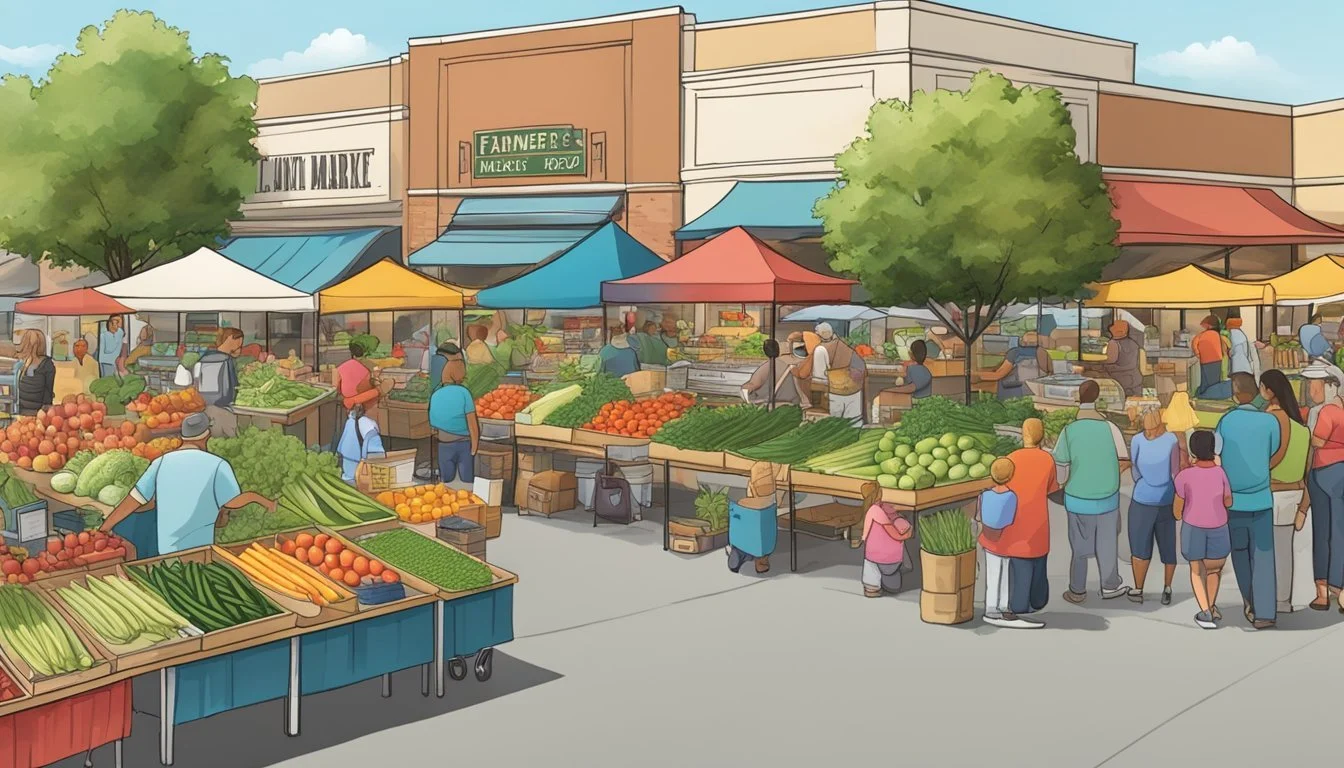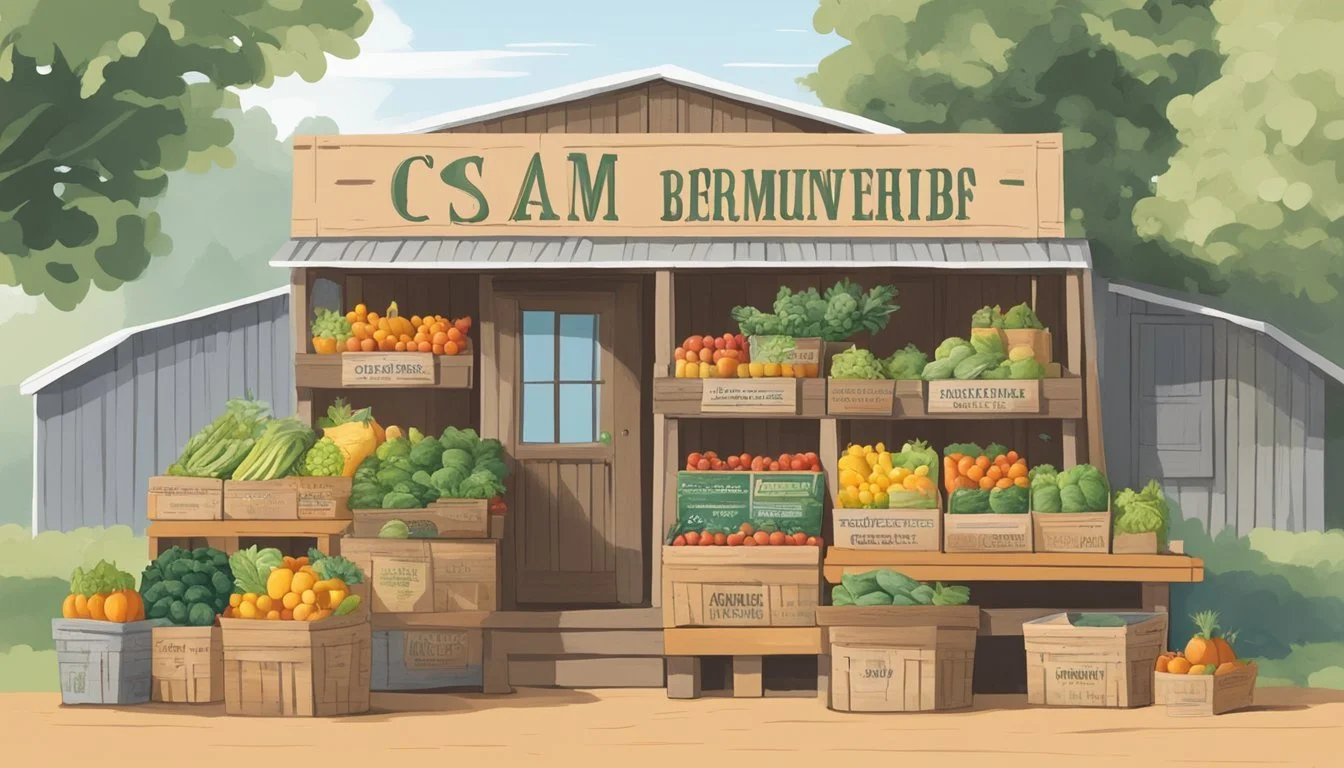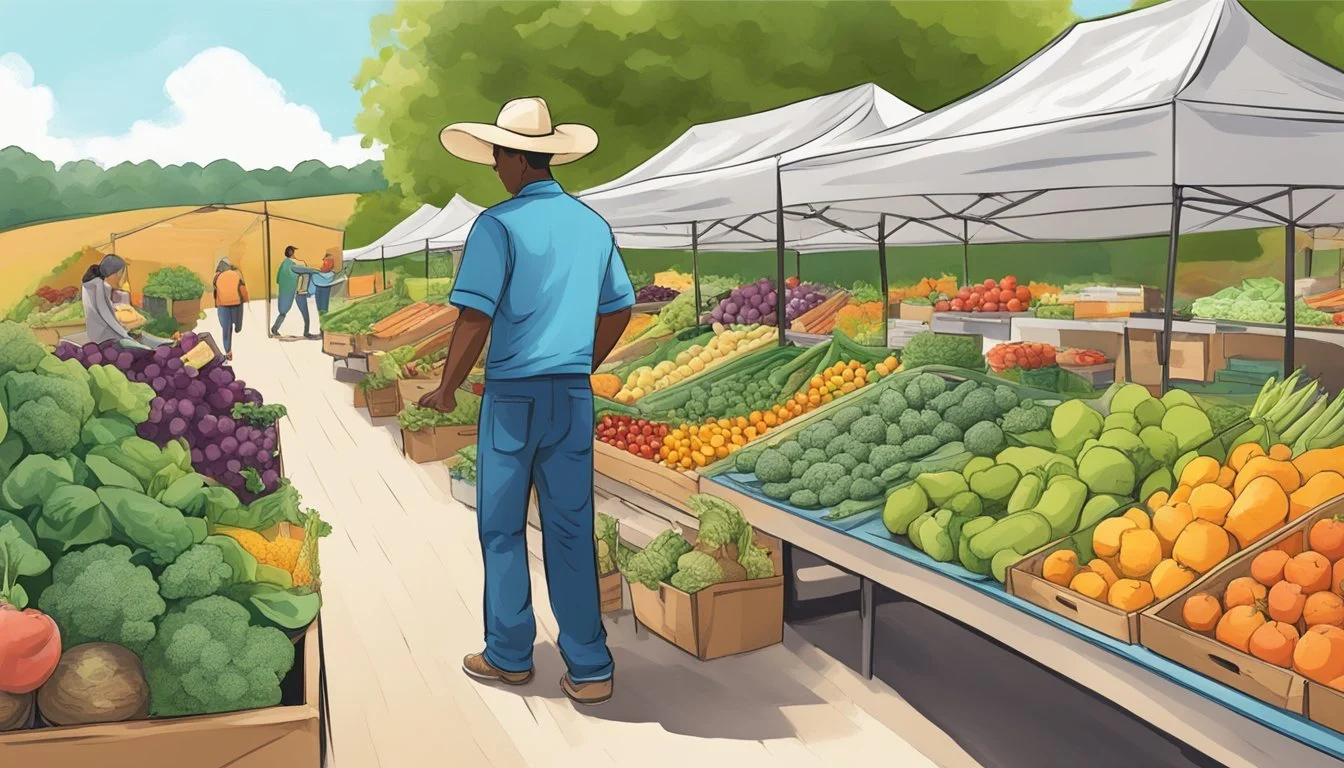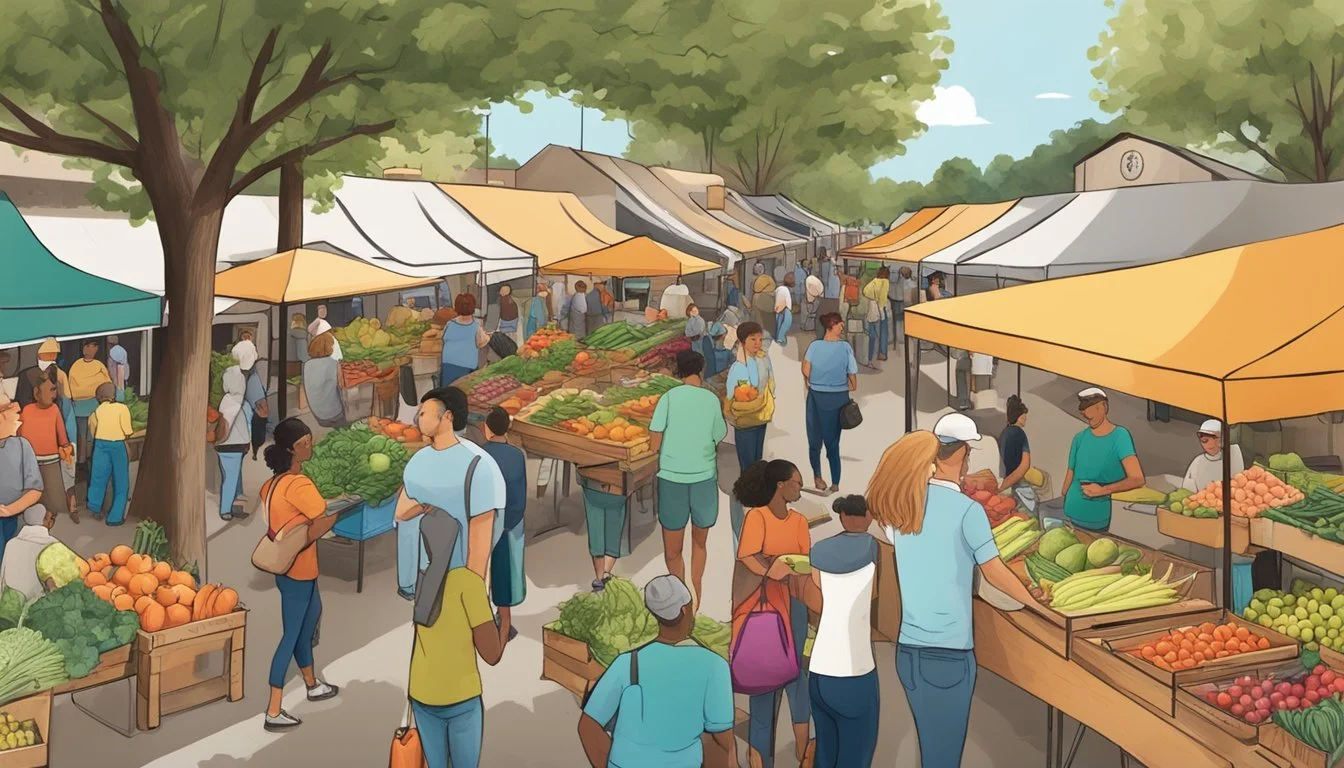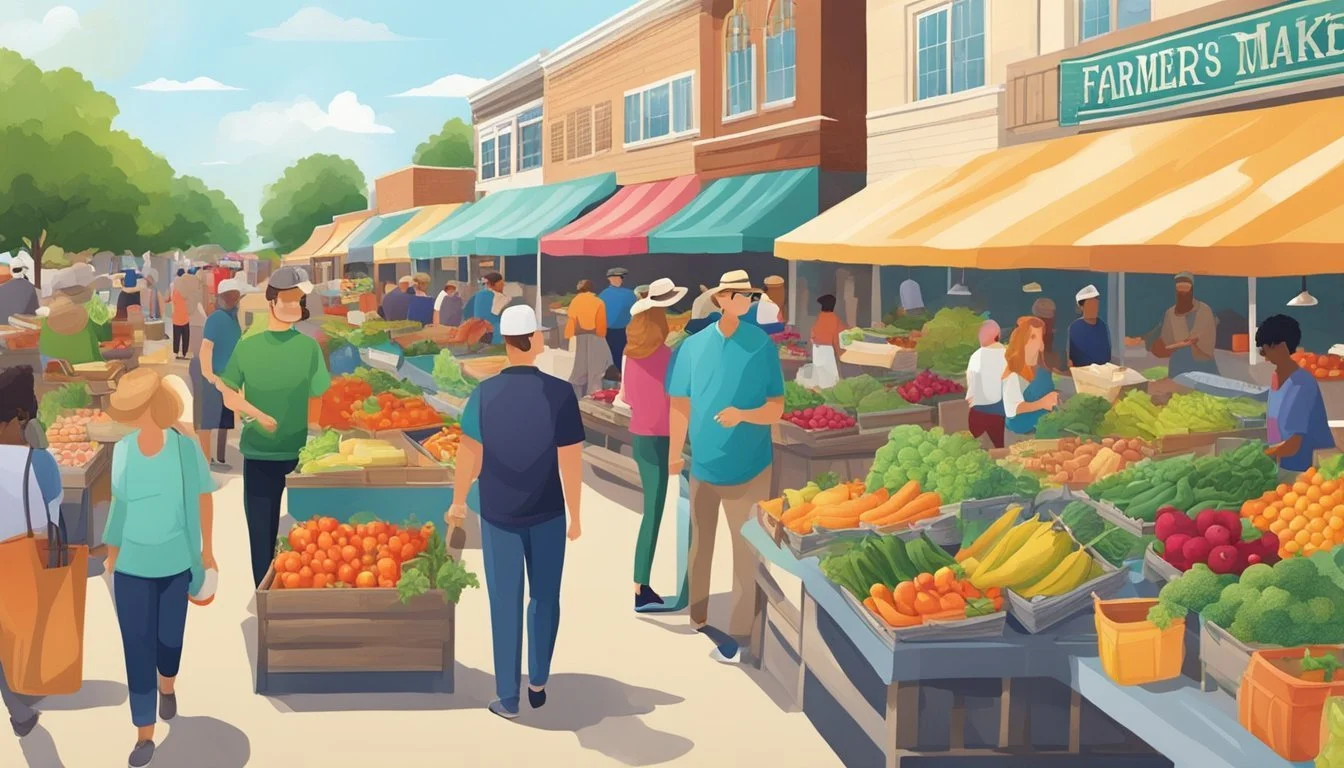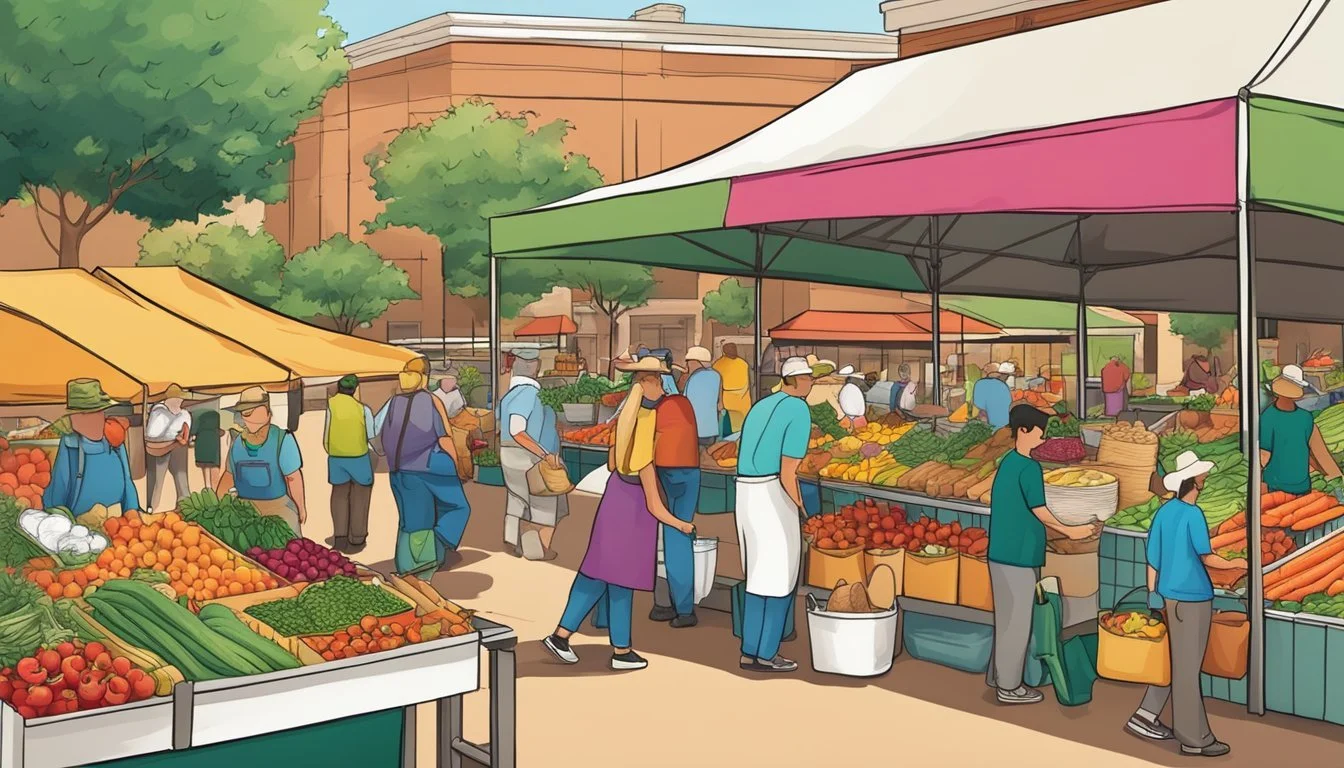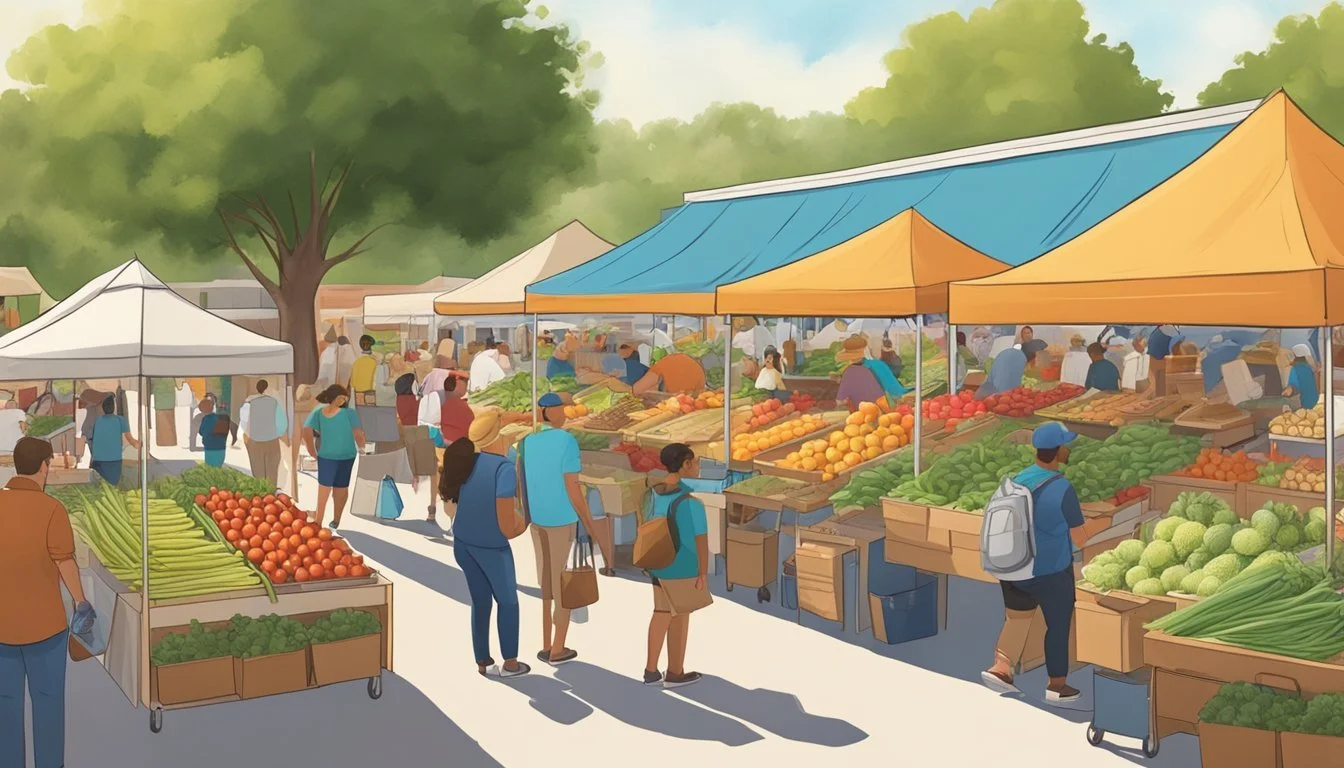Community Supported Agriculture (CSA) in Lewisville, TX
A Guide to Local Produce Subscriptions
Community Supported Agriculture, commonly known as CSA, represents a growing movement in Lewisville, Texas, that strengthens the bond between local farmers and community members. Through CSA programs, consumers in Lewisville can purchase a share of a local farmer's harvest, providing them with a regular supply of fresh, locally grown produce. This model not only supports local agriculture and contributes to the sustainability of family farms but also allows residents to become active participants in the cultivation and selection of their food.
The success of CSAs in Lewisville is evident in the diversity and number of farms offering these programs. Members of the community have the opportunity to engage with farms like Candy Girls Chick and Livestock, East Texas Homestead Farms, and Walnut Creek Farm, each providing unique offerings ranging from vegetables to farm products. These farms commit to farming practices that prioritize environmental stewardship and community well-being, ensuring that CSA members receive quality products while contributing to a healthier food system.
For residents interested in freshly harvested food and supporting local farmers, joining a CSA in Lewisville presents an accessible option. It not only fosters a sense of community through shared support for local agriculture but also educates members on seasonal eating and the benefits of sustainable farming. As these programs continue to gain traction, they reinforce the notion that a well-supported agricultural community is fundamental to the overall health and economy of the region.
Understanding CSA
Community Supported Agriculture represents a sustainable approach to farming and food distribution, focused on local farms and seasonal harvests. In Lewisville, TX, CSAs facilitate a connection between residents and farmers through food subscriptions that support community and agriculture.
Defining Community Supported Agriculture
Community Supported Agriculture (CSA) is a model where individuals commit to purchasing a share of a local farmer's harvest in advance. This subscription-style system offers mutual support: it provides the farmer with predictable income and consumers with fresh, locally-produced food.
History and Evolution of CSA in Lewisville
In the United States, the notion of CSA started gaining traction in the 1980s. Lewisville, TX, saw a rise in CSA participation as residents sought fresher produce and a direct connection with their food sources. Though information on the year of establishment of the first CSA in Lewisville is limited, the growth of CSAs in the area reflects a broader national trend towards sustainable community-supported farming practices.
How CSA Works
When consumers purchase a CSA subscription, they typically receive a portion of the farm's produce throughout the growing season.
Subscription Model:
Weekly/Bi-weekly Picks-ups: Shareholders often collect their produce directly from the farm or designated drop-off points.
Season Length: Usually 20-22 weeks, aligning with the regional growing season (commonly May to October in Lewisville).
The produce included in CSA shares varies based on what is in season and ready to harvest. This system encourages community members to try new vegetables and fruit varieties while supporting the livelihoods of local farmers.
Benefits of Joining a CSA
Joining a Community Supported Agriculture (CSA) in Lewisville, TX, offers numerous advantages, from enjoying freshly picked produce to supporting local farmers. Members experience a direct farm-to-table connection that promotes health and community engagement.
Freshness and Flavor
Members of a CSA benefit from fruits and vegetables at the peak of their freshness, which often translates to better flavor. Getting weekly shares directly from the local farms, families in Lewisville can enjoy crisp, nutrient-rich produce far superior to what's typically found at grocery stores.
Health and Nutritional Value
The health benefits of joining a CSA are considerable. Vegetables and fruits from a CSA tend to be more nutritious, as they are harvested close to their delivery date, preserving more of their vitamins and minerals. CSA members can feed their families with confidence, knowing they have access to a variety of healthy, seasonal food.
Environmental Impact
CSAs in Lewisville significantly reduce food miles, leading to a lower environmental impact. This model of food distribution supports sustainable farming practices, preserving local land and reducing carbon footprints. Members share the responsibility to foster an eco-conscious local community.
Economic Advantages for Members and Farmers
Joining a CSA fosters a reciprocal relationship where members save money and farmers receive financial stability. In essence, members invest in local farmers, who in turn provide a bountiful supply of produce throughout the season. By pre-paying for shares, members can often benefit from cost savings compared to traditional retail. At the same time, farmers gain a secured income to cover their operational costs, strengthening the area's agricultural economy.
CSA Membership and Subscription Details
In Lewisville, TX, CSA memberships offer a means for consumers to access fresh, seasonal produce directly from local farmers, often including a variety of vegetables, fruits, and occasionally other farm products such as eggs, meat, and cheese.
Understanding CSA Subscriptions
Community Supported Agriculture in Lewisville operates on a subscription basis, where members pay an up-front fee to receive a share of the harvest throughout the farming season. These subscriptions are integral to the functioning of a CSA as they provide the necessary capital for farmers at the start of the season. The commitment from consumers allows farmers to plan and act with assured financial backing.
What's Included in a CSA Box?
A typical CSA box in Lewisville can be quite diverse, containing a selection of:
Vegetables: A variety of organic produce.
Fruits: Seasonal selections based on availability.
Additional Options: Eggs, meat, cheese (varies by farm).
The contents are curated based on what is in season, ensuring members receive the freshest produce directly from the market to their table.
Membership Fees and Payment Plans
Membership fees are structured to reflect the cost of a season’s worth of produce. They are paid upfront, providing the farmer with the money required to prepare and grow the season’s crops. Some CSAs offer payment plans to make their shares more accessible. While fees can vary by farm and share size, they are designed to be a cost-effective solution for members looking to enjoy fresh, local, and often organic produce.
Selecting a Local CSA Program
In Lewisville, TX, those interested in subscribing to a CSA program can experience the advantages of high-quality, fresh produce while forming a direct relationship with local farmers. Understanding the options available and the key considerations can guide individuals to a compatible CSA farm.
Researching CSA Options in Lewisville
Residents of Lewisville looking for a CSA program have several farms to consider. One can begin by exploring CSAs such as East Texas Homestead Farms in nearby Mineola, known for its historic land and commitment to natural agriculture, although its vegetable subscriptions are popular and may be sold out. Another option is Candy Girls Chick and Livestock, which has a history of farming and dedication to building local food sources. It is advisable to contact them directly for up-to-date information about their CSA offerings.
Local Farms
East Texas Homestead Farms: Historical site, may have waitlists.
Candy Girls Chick and Livestock: Call for current CSA status.
Considerations for Choosing a CSA
When selecting a CSA program, prospective subscribers should consider several factors to ensure a suitable match with their needs. The location of the farm and pickup points is essential for convenient access. CSA farms often provide a predetermined box of produce, typically including a variety of vegetables and sometimes options like microgreens. However, some farms now offer customization of the CSA boxes, accommodating preferences for specific types of produce.
Key Considerations
Location: Proximity to the farm or pickup locations.
Seasonality: Availability of seasonal produce that Texas offers.
Variety: Types of veggies and farm products included.
Customization: Option to personalize the contents of the CSA box, if offered.
Relationship: Potential to connect with farmers and learn about the farming process.
Before committing to a CSA, it is crucial for individuals to directly confirm the details with the farms, as offerings and availability can change.
Maximizing Your CSA Experience
When joining a Community Supported Agriculture (CSA) program in Lewisville, TX, members can enjoy a bounty of farm-fresh produce. To fully benefit, they need to master the art of cooking with seasonal produce and learn the best ways to store and preserve their share.
Cooking with CSA Produce
Using CSA produce at home offers a chance to explore diverse vegetables and fruit which can lead to new flavors and cooking methods. Seasonal recipes not only guarantee peak flavor but also enhanced nutritional value. CSA members should consider:
Looking for recipes that highlight seasonal ingredients.
Being creative and substituting ingredients in favorite recipes with CSA items.
It's essential to be flexible and willing to try new things, as CSA boxes often come with a varied assortment.
Storing and Preserving Fresh Produce
Proper storage extends the life of CSA produce, ensuring that members can enjoy their fresh bounty for as long as possible. Here are some tips for storing and preserving:
Use airtight containers or produce-specific storage bags to keep items fresh.
Fruit should be refrigerated or kept at room temperature depending on ripeness.
Some vegetables like potatoes and onions are best kept in a cool, dark place.
Preserving produce through canning, freezing, or drying allows for enjoyment beyond the growing season.
Understanding the best practices for each type of produce can greatly reduce waste and allow for more enjoyment of the diverse offerings.
Community and Economic Impact
Community Supported Agriculture (CSA) initiatives in Lewisville, TX contribute significantly to the local fabric by nurturing strong community relationships and bolstering the local economy. These impacts are evident through the lens of CSA operations and the patronage they receive from local residents.
Building Community Relationships
CSAs foster a symbiotic relationship between residents and farmers. By opting into CSA programs, community members directly invest in local farms, generating a sense of shared commitment. This investment is not purely financial; it extends to an understanding and appreciation of the agricultural process. At the Lewisville farmers market, one might notice the presence of shared booths where multiple CSAs come together to offer fresh produce, thereby strengthening the community bond.
Supporting Local Agriculture and Economy
Local agriculture receives a substantial boost from CSA models. Farms like East Texas Homestead Farms, despite being sold out for the season, underscore the financial viability and community demand for fresh, local produce. Candy Girls Chick and Livestock is another example, harnessing support for local farming through community engagement. The impact on the local economy is multifaceted:
Direct Financial Support: CSA subscribers provide upfront capital allowing local farms to plan for the season, covering costs without the need for loans.
Local Spending Circulation: Money spent on CSAs re-enters the local economy, as these farms tend to purchase from local suppliers and hire within the community.
Nationally, CSA sales contribute to a sizable portion of direct-to-consumer revenue in agriculture, emphasizing the role of CSAs in the larger United States market.
Exploring Beyond Vegetables
Community Supported Agriculture (CSA) in Lewisville, TX, offers a diversity of locally grown products, extending well beyond the typical vegetable shares. A myriad of additional offerings enriches the CSA experience for members throughout the seasons.
Additional CSA Offerings
Tea: Often, CSA farms collaborate with local tea producers to include a variety of herbal tea blends that feature seasonally harvested herbs.
Flowers: Subscriptions sometimes contain locally grown bouquets, enhancing the aesthetic and aroma of homes while supporting flower farmers.
Honey: Local honey, harvested from the nearby apiaries, not only adds sweetness to the share but also helps in advocating for sustainable beekeeping.
Meat: For those interested in pasture-raised meats, certain CSAs provide options for beef, poultry, pork, and lamb, adhering to ethical farming practices.
Cheese: Artisanal cheeses from local dairies give members a taste of the region's craft while contributing to the support of local cheese makers.
Grains: Whole and processed grains such as wheat, corn, and rice might be offered, ensuring that members have access to staple items.
Eggs: Farm fresh eggs, laid by free-range chickens, are a common fixture in CSA shares, known for their rich flavor and nutritional value.
Fruit: A variety of fruits complements the vegetable selection, offering a sweet balance and broadening the range of fresh produce available.
By incorporating these diverse options, CSAs in Lewisville not only provide a robust food supply but also contribute to the support of a wide array of local producers, enhancing the economic and ecological well-being of the community.
Challenges and Considerations
In Community Supported Agriculture (CSA), members typically join with a level of commitment to the local food system, sharing in both the risks and rewards of agriculture. Understanding the potential challenges and setting realistic expectations is vital for both the CSA provider and its members.
Potential Risks and Disadvantages
CSA farms operate on pre-paid memberships where families commit to supporting the farm in exchange for a share of the harvest. Risks such as adverse weather conditions or pest infestations can impact farming operations. A key disadvantage for members is the lack of control over these unforeseen circumstances, which can affect both the quantity and variety of produce they receive.
Weather: Unexpected weather events can lead to crop failures.
Farming challenges: Pests and diseases may affect the yield despite careful management.
Seasonal Variability and Yield Expectations
CSA relies on seasonal produce, and the seasons dictate what is available. The yield can fluctuate annually due to variations in weather patterns. It's important for members to have realistic yield expectations, understanding that farming is inherently unpredictable. Members are typically required to be flexible and accept the nature of seasonal variability.
Spring: May bring an abundant variety of leafy greens but can also be prone to late frosts.
Summer: Often provides a bounty of fruits and vegetables but can include drought challenges.
Fall: Can offer a rich harvest of root vegetables, though early frosts can pose a threat.
Winter: CSA shares may be less diverse and depend on storage crops or greenhouse production.
Each season holds its own potential for abundance as well as scarcity, and members are encouraged to embrace the ebb and flow of the agricultural cycle.
Support and Resources
Community Supported Agriculture (CSA) in Lewisville, TX offers a wealth of support and resources aimed at fostering direct relationships between members and farmers. These initiatives promote education, community engagement, and effective marketing for CSA programs.
Educational Contents and Newsletters
CSA programs in Lewisville, TX often provide educational content to their members. This material focuses on sustainable farming practices and the benefits of local produce. Members may receive monthly or seasonal newsletters that include information such as:
Updates on farm activities and crop progress
Details about produce selections for upcoming deliveries
Tips on how to store and prepare the fresh produce
These newsletters not only educate but also create a sense of community among members and strengthen the direct relationship between customers and farms.
Community Events and Farmer Support
Local farms in the Lewisville area incorporate community events to enhance member engagement and support for the CSA programs. These events might include:
Farm tours and farmer meet-and-greets
Cooking classes or demonstrations featuring CSA produce
Farmers markets and CSAs often collaborate, providing spaces for members to give feedback, learn more about their food sources, and directly support local agriculture.
Such events serve as a platform for marketing CSA programs and allowing farmers to connect with a wider community, ensuring a thriving ecosystem where both members and farmers benefit.
Looking Ahead
As Lewisville, Texas, continues to develop its local food systems, the community's engagement with Community Supported Agriculture (CSA) is integral to shaping a sustainable future. Embracing local CSAs influences both seasonal eating patterns and environmental consciousness.
The Future of CSAs in Lewisville and Beyond
In Lewisville, CSA farms stand at the forefront of a movement toward sustainability and reduced carbon footprints. They provide an opportunity for communities to connect with local farmers, bolster the local market, and promote environmental stewardship. Subscriptions to CSA boxes often vary by seasons, ensuring participants receive the freshest produce, while supporting agricultural diversity.
With a focus on the future, local farms are anticipated to implement advanced marketing strategies, including social media outreach and newsletters, to increase community awareness and participation. The ongoing trend for local and sustainable products predicts a steady rise in CSA subscriptions as consumers become more environmentally aware of their food choices and their impact on the planet.
The push for local food systems has highlighted the role of CSAs in decreasing the environmental impact of long-distance transportation of food items, thereby reducing the community's overall carbon footprint. By fostering direct relationships between consumers and farmers, Lewisville's CSA programs are expected to gain momentum, contributing to a resilient local economy.
Trends indicate a growing number of consumers are inclined to invest in CSA models due to their transparency and the mutual support they provide both the farm and the community—a symbiotic relationship that's anticipated to flourish in the coming years.
Conclusion
Community Supported Agriculture (CSA) embodies a partnership between local farms and residents in the Lewisville, Texas community. It plays a pivotal role in fortifying the symbiosis between consumers and producers. CSA programs in Lewisville help maintain a strong community fabric and stimulate a local economy that values wholesome, nutritious produce.
Participants in CSA enjoy multiple benefits, confirming their supporting role in a sustainable food model. They receive fresh, seasonal produce that often surpasses what is readily available in conventional markets. This model of agriculture promotes a healthy lifestyle through a diet rich in locally sourced vegetables and fruits.
The relationship fostered between Lewisville community members and local farmers is not just transactional but relational. By investing in shares of a farm's harvest, individuals directly contribute to the upkeep and success of local agriculture. In return, farmers engage in sustainable practices, safeguarding Texas land for future generations.
The support for CSAs in Lewisville manifests not only in economic terms but also endorses a healthy, interconnected community through shared responsibility. By choosing CSA, individuals opt for a food distribution channel that is resilient, less reliant on long-distance transportation, and one that reduces the community's carbon footprint.
In the context of Lewisville, these CSA programs bolster the tenets of a strong, supportive, and nourished community, making it evident that the attributes of Community Supported Agriculture go well beyond the perimeter of a farm.

